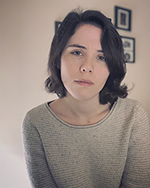A great poem makes you feel it a miracle that any human being brought it into existence. There’s no formula for it; it shows you something you’ve never seen before. In contrast, I tend to dislike poems which are derivative of pre-meditated ideas and/or are derivative of academic ideas.
 Malahat Review volunteer and past contributor Ugonna-Ora Owoh talks with the issue #209 contributor about what she wants from a poem, how we bring meaning to our experiences, and the power of the mythic and the sacred in her poem, "Oracular."
Malahat Review volunteer and past contributor Ugonna-Ora Owoh talks with the issue #209 contributor about what she wants from a poem, how we bring meaning to our experiences, and the power of the mythic and the sacred in her poem, "Oracular."
UO: There’s an obvious theme of prophecy and mythology throughout. Did you come up with the theme first, or did it surface later (like the poem claimed its space)? Do you often incorporate these themes into your writing?
JB: The first words that came to me in my kitchen that day were, “I was such a cynic when I met you/Now they call me Delphic.” I have always been attracted to the power of the mythic and the sacred as a way for language to do something impossible. For me, my poetry originates from that space where you can suspend disbelief long enough to be entranced within the world. I often become overwhelmed by the mundane and the unstable nature of the future, so poetry mostly becomes the place where prophecy can achieve something against every other uncertainty.
Read the rest of Julia's interview as well as her poem, "Oracular," on TMR's website.
Winter Issue Interview with Dawn Lo on CNF
 Malahat Review volunteer James Kendrick talks with the issue #209 contributor about clarity through distance, giving voice to her experiences, and how place factors into her sense of identity in her memoir, "Life Cycles."
Malahat Review volunteer James Kendrick talks with the issue #209 contributor about clarity through distance, giving voice to her experiences, and how place factors into her sense of identity in her memoir, "Life Cycles."
JK: There is a motif of deep connection between one’s sense of self and the place of their birth. Given this, and the theme of returning home versus living as an expatriate, could you talk a little bit about your life in Singapore, why you moved there from Canada, and how that is connected to your writing?
DL: I moved abroad, as most people do, because of work, either their own or their partner’s. “Expat” is such a dirty word to me. A lot of expats like to make Asia their playground, without acknowledging their privilege or trying to immerse in local culture in a meaningful way. Immigrants are expected to assimilate. Expats are not.
But the fact of the matter is I, by definition, have been an expat for a long time. I grew up a Third Culture Kid in Beijing, but being Chinese in ethnicity and heritage meant that I didn’t have the stereotypical experience, at least intellectually. It was a strange and humbling experience looking like a local and living, in the broad strokes, the local culture but knowing you were better off financially. I think this is why my writing is obsessively about identity and belonging.
Read the rest of Dawn's interview as well as an excerpt of "Life Cycles" on TMR's website.